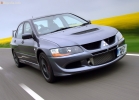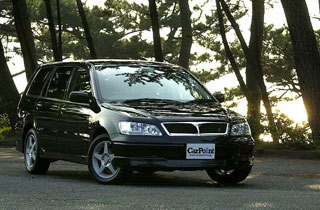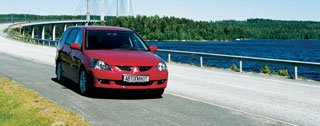Test drive Mitsubishi Lancer Evolution VIII 2003 - 2005 sedan
Valentine and Valentine
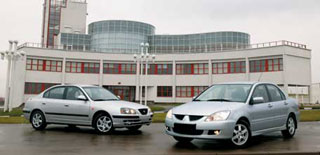 In this case, there are no interesting (places even original!) Details about the faceless appearance of the Far Eastern cars in this case. Another question is how you perceive this originality and how much the very details and their combinations do not contradict your taste.
In this case, there are no interesting (places even original!) Details about the faceless appearance of the Far Eastern cars in this case. Another question is how you perceive this originality and how much the very details and their combinations do not contradict your taste. This title would look much more spectacular than five to six years ago, when the Korean car, or rather its predecessor, was sold with us under the name Lantra. Lancer and Lantra sound? It is only a pity that the reason for such a test at that time is not the wast Lancer in size noticeably larger than the previous one, the prices of both models in our market are almost the same today, so customers are not without reason to consider Mitsubishi Lancer and Hyundai Elantra as a reasonable alternative. Alas, the combination of names is now this: after 1999, Hyundai is almost sold throughout the world under the name used before in the American market. Well, apparently, Korean marketers had their own thoughts.
Speaking of marketing.
From the standpoint of the Mitsubishi trade policy in Russia, the late 90s would be difficult to believe that after a few years Lancer will be in our market one of the best offers in its class (C). Nevertheless, a fact. Do not believe? Armed with a calculator.
 Lancer is sold in two trim levels, Comfort and Comfort+. Now take the specification of any of them and try to order similarly equipped, say, the current autobestseller Vsevolozhsk Ford Focus. Then transfer the amount received from the euro to dollars (they estimate Lancer). And do not forget that Lancer is completely manufactured and assembled in Japan, which is popularly considered to be almost the first guarantee of reliability and durability, which means that they will be considered accordingly when selling in the secondary market. Earnestly? Hyundai Elantra Korean car, but it seems to be positioned in a higher size class (D). However, if he is there, then at the lowest border, so that in recent years the class C sedans have grown in (the same Lancer and Focus, for example) are not much inferior to it in size. Nevertheless, Elantra is an interesting offer for those who wish to get a car more spacious for those who wish to get a car. And 5 (five!) Years of guarantees a good argument for those who are gnawing a worm for doubts about the reliability of cars from the country of morning freshness.
Lancer is sold in two trim levels, Comfort and Comfort+. Now take the specification of any of them and try to order similarly equipped, say, the current autobestseller Vsevolozhsk Ford Focus. Then transfer the amount received from the euro to dollars (they estimate Lancer). And do not forget that Lancer is completely manufactured and assembled in Japan, which is popularly considered to be almost the first guarantee of reliability and durability, which means that they will be considered accordingly when selling in the secondary market. Earnestly? Hyundai Elantra Korean car, but it seems to be positioned in a higher size class (D). However, if he is there, then at the lowest border, so that in recent years the class C sedans have grown in (the same Lancer and Focus, for example) are not much inferior to it in size. Nevertheless, Elantra is an interesting offer for those who wish to get a car more spacious for those who wish to get a car. And 5 (five!) Years of guarantees a good argument for those who are gnawing a worm for doubts about the reliability of cars from the country of morning freshness. We took the Hyundai ElanTra 1.6 GLS for the $ 14890 test, and we got the Mitsubishi Lancer 1.6 in the Comfort+configuration for 15790 USD. However, if you subtract this very plus from Comfort+ (namely the external mirrors in the body color, fog lights, alloy wheels), then the remaining Comfort will practically equal with Elantra GLS not only in equipment, but also at a price of 14990 USD.
Both cars are equipped with ABS, an immobilizer, a centralized locking of doors, two airbags, air conditioning, heated seats, four electric windows and, of course, external electric mirrors. In Hyundai, a proprietary radio was also discovered, albeit not the most expensive, but decently sounding. But the Blaupunkt, which you will see in the images of the Mitsubishi salon, you should not take into account the dealer and is not taken into account at the specified price.
 Far Eastern traditions
Far Eastern traditions We will not repeat the thoughts that have been sorely about the faceless appearance of the Far Eastern cars primarily because there is no need to talk about gratitude here. In both cases, designers clearly wanted to say their word and give cars a certain character. Must admit: characteristics are present. And interesting (even original places!) There are also enough details. Another question is how you perceive this characteristic and how much the very details and their combinations do not contradict your artistic perception of reality. If everything is in order with this, then you can safely move on to the internal content.
Lancer is executed in the Japanese tradition of minimalism, and a black lining under the entire dashboard, apparently, apparently, the trend of a new corporate style: something similar received something similar, and Outlander. The plastic of the upholstery of the salon is of high quality, but it only looks soft in most cases. Want to disperse a little boredom, Put the avenue: There, in the photographs, you will see a slightly different color scheme of the interior. Actually, it is more correct to say black and white: the panel and upholstery of the cabin are two-story, in different tones of gray. So to speak, revives. In accordance with another Japanese tradition, not every high will be difficult to get rid of the wheel at the wheel of Lancer, and adjusting the inclination of the pillow will not help. But at the back surprisingly there is a lot of space for the legs. What can not be said about the width: the three of the back seat, to put it mildly, is cramped, and this is not a miscalculation of designers, just the car is inscribed in a certain overall category of the Japanese tax system. But what exactly you won’t sleep on it, so it’s a sloping ceiling above the rear seats for high passengers reserve front places. The interior of Hyundai is made in a borrowing manner traditional for the Korean auto industry: it seems that you have already seen all this, but you don’t remember where exactly. However, there is no doubt about the dashboard almost Saab. Looking at the abundance of soft plastic and high quality hard, and is tempting to say something about a higher class. But the ardor is somewhat cooling the distant lightness of rotation of the ventilation system and a noticeable loud on the steering wheel and the steering column casing.
Elantra is a little more spacious: the front seats adjustment range is larger, and even if they are pushed back to the stop, the rear seat passengers are easily survived. And if there weren’t a representative sedan on the back side of the backs of plastic linings (I suppose, not a representative sedan!), It would be even more comfortable. However, in special cases, the driver, even a long -legged one, maybe, without losing convenience, two handles will do a little to the occupied space will allow you to choose the optimum and inclination of the pillow. The width of the rear seat is quite enough for three passengers of normal complexion, and if there are two of them, then they will probably use the existing folding armrest.
 Signs of the school
Signs of the school The lack of decent traction on the bottoms in our time is simply a bad tone. In this sense, both Lancer and Elantra demonstrate worthy manners: they confidently crawl in traffic jams and without visible problems begin to accelerate even from 1,500 rpm. After chasing Lancer, it is not difficult to notice an easy increase in the region of 3000-3500 revolutions (in general traditional for mitsubishi), and the ability to accelerate remains up to 6000. Hyundai has a more even, but still tangible maximum dynamics at higher speeds: In order to sharply add, you need to put the tachometer arrow at 4000. But the cutting is already 6700, so for quick overtaking, feel free to switch down: the turnover is guaranteed. At the same time, acceleration is accompanied by an absolutely amazing sound, you might think that this is not Lancer, but Elantra Evolution wanders along the upper lines of the World Rally championship. True, this sound is too well heard in the cabin.
In fact, of course, Lancer in everything is a little more accurate in the reaction to pressing the accelerator pedal, in the moves of the gear lever and in controlling, ElanTra is also not bad, but it is not necessary to get used to it too informative: the first time there may be sharp clips. And finally everything falls into place, as soon as it comes to uneven and winding country roads.
Lancer reacts to the turn of the steering wheel quickly, clearly and unequivocally, the rolls are very small. In response, the steering wheel accurately informs you about what is happening with the wheels. If it were slightly smaller in diameter, Lancer would only benefit from this: it would be more convenient to rotate, and a slight increase in reactive effort would not hurt. The sports character is also manifested at irregularities: at low speeds it shocks noticeably, but as soon as the speedometer arrow reaches 70-80 km/h, you forget about any unpleasant sensations, you only admire the energy intensity of the suspension.
Elantra opposite. Sensitivity to steering influences is low, the reaction is very moderate, the rolls are pretty decent. But excellent stability and simply magnificent smoothness, regardless of the quality of the road surface and speed: the suspension simply devours unevenness. And with all this, there is no buildup on the waves and generally uniformity in behavior, except that noticeable clinks during intensive braking.
What can be said in conclusion? It is clear that if you are a lover of active style and are looking for excitement in a car, then in this pair you will surely prefer Lancer. It is no less obvious that for distant travel with the whole family, the best choice will be Elantra, it is not only more comfortable, but also richer with all kinds of pleasant trifles. Another question is how important the authority of a particular manufacturer is and how much this authority outweighs other considerations, for example, the cost of service. And you must decide on this yourself.
Mitsubishi Lancer 1.6 is provided by Rolf Holding.
The Hyundai Elantra 1.6 car was provided by Karnet 2000.
Text: Dmitry Filonov
Photo: Alexander Nozdrin

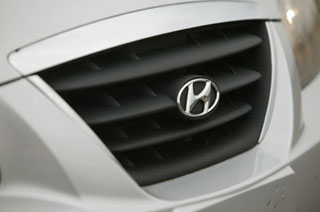
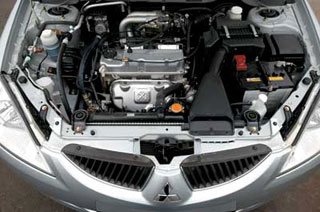

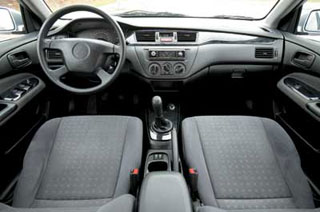
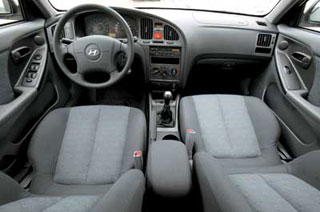
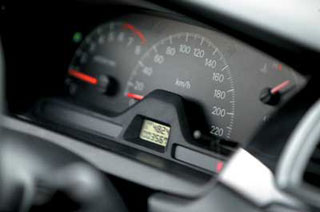
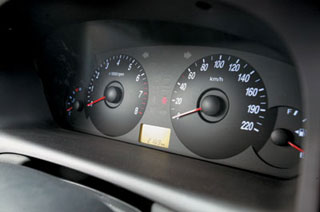
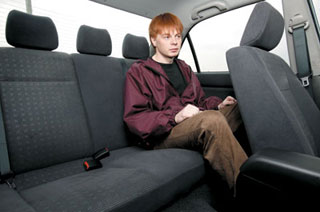

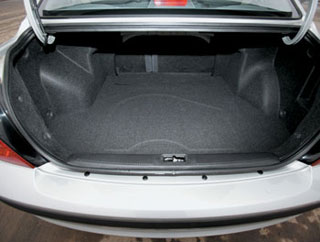
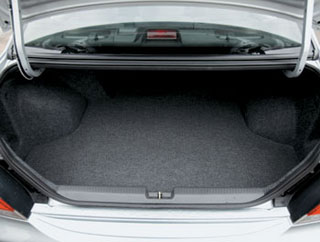
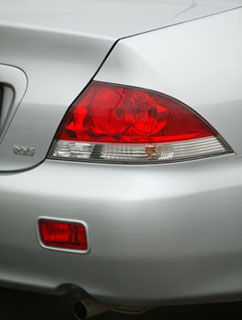
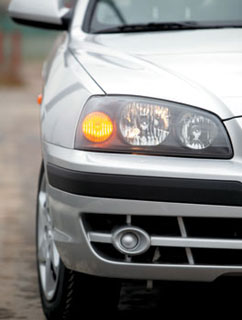
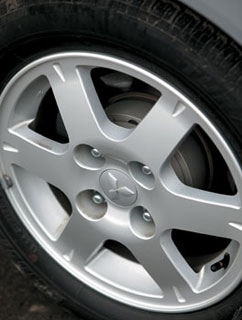
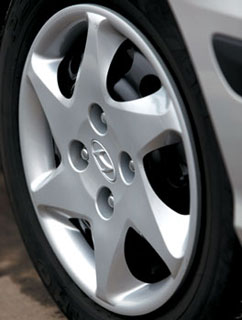
Source: Wheel magazine [No. 76/2004]

